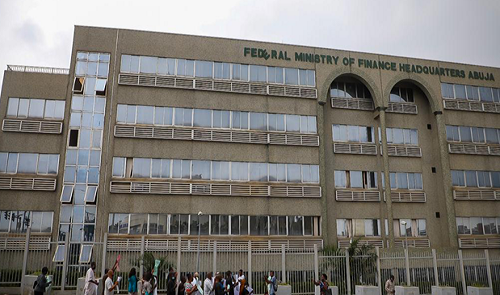The Plight of Indigenous Contractors in Nigeria: A Cry for Payment and Justice
The headquarters of the Ministry of Finance in Abuja became the stage for a dramatic protest on Wednesday as local contractors, united under the banner of the All Indigenous Contractors Association of Nigeria (AICAN), voiced their desperate plea for payment. Their demand: a staggering N4 trillion owed for capital projects completed in 2024. The contractors, having exhausted all avenues of peaceful negotiation, resorted to this drastic measure to draw attention to their dire situation and compel the government to honor its financial obligations. This protest underscores the growing concerns about delayed payments and the adverse impact on the livelihoods of contractors, the stability of the construction industry, and the broader Nigerian economy.
At the forefront of the demonstration was Babatunde Seun, the Secretary of AICAN, who articulated the contractors’ grievances and the frustrating sequence of unfulfilled promises. Seun revealed previous engagements with both the Accountant-General of the Federation, Shamseldeen Ogunjimi, and the Minister of Finance and Coordinating Minister of the Economy, Wale Edun. Despite assurances of swift payment within 48 hours, only a negligible fraction of the 5,000 members received their dues. The contractors felt betrayed by the government’s failure to uphold its commitments, leaving them in a precarious financial predicament. The disparity between the promised payments and the actual disbursements fueled their suspicion and frustration, deepening their resolve to escalate their protest.
Seun’s testimony painted a bleak picture of the human toll exacted by these delayed payments. Contractors, once vibrant contributors to the economy, found themselves mired in debt, unable to meet basic family needs. The prospect of the upcoming school resumption added another layer of anxiety, as many parents struggled to afford school fees. The protest, therefore, became not merely a fight for financial remuneration, but a struggle for survival, for the dignity of labor, and for the future of their families. Their heartfelt pleas resonated with the raw emotion of individuals pushed to the brink, their livelihoods hanging by a thread.
The contractors’ protest was more than a demonstration of their economic hardship; it was an indictment of the government’s handling of contractual obligations. The release of warrants without cash backing demonstrated a disconnect between bureaucratic processes and the practical realities faced by the contractors. This action, while seemingly a step towards payment, ultimately proved to be a hollow gesture, further exacerbating the contractors’ distrust. The protest highlighted the urgent need for greater transparency and accountability in government financial operations. The contractors demanded not only payment but also a system that ensures timely and consistent disbursement of funds for completed projects.
The protest took a disruptive turn as the contractors effectively shut down the Ministry of Finance, barricading the entrance and preventing staff, including the Minister’s convoy, from accessing the building. This bold action reflected their determination to make their voices heard and to disrupt the status quo until their demands were met. The placards they carried further underscored their message, accusing the National Assembly of inaction in the face of their suffering. The blockade served as a symbolic act of defiance, highlighting the power of collective action in demanding accountability from those in power. It was a clear message that they would not be silenced or ignored until justice was served.
The AICAN protest shines a spotlight on systemic issues within the Nigerian construction industry and government financial management. The immense amount owed, N4 trillion, speaks volumes about the scale of the problem and the potential ramifications for the national economy. The contractors’ plight represents a broader challenge faced by businesses relying on government contracts, raising questions about the efficacy of procurement processes and the protection of contractors’ rights. The protest signifies a critical juncture, compelling the government to address these issues with urgency and transparency to restore confidence and ensure the sustainability of the construction sector, a vital driver of economic growth and development. The contractors’ demands extend beyond mere payment; they call for a systemic overhaul to prevent future occurrences of this nature and guarantee fair treatment for those who contribute to the nation’s infrastructure development.














